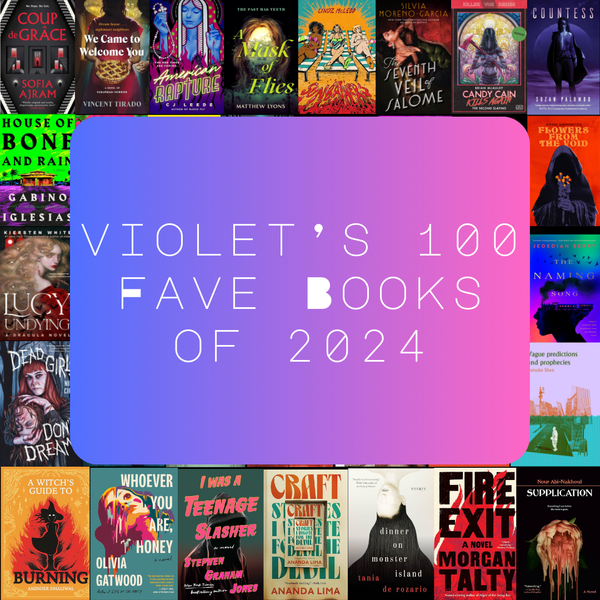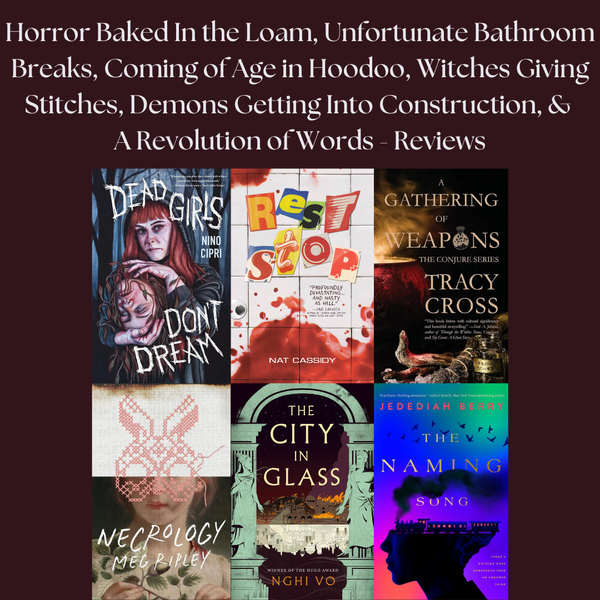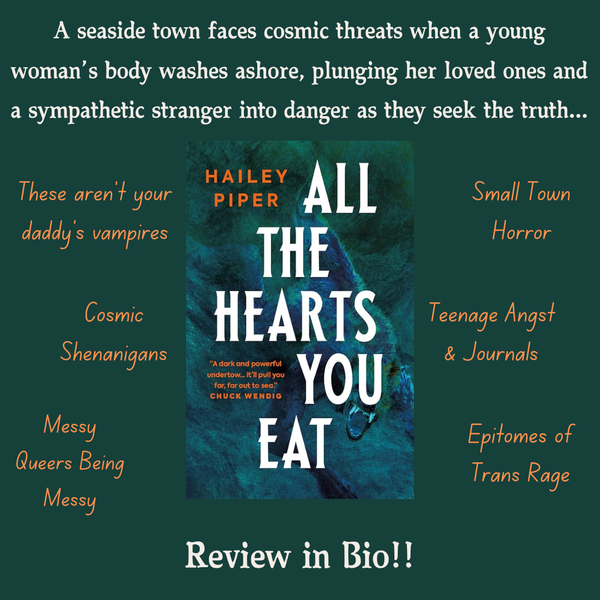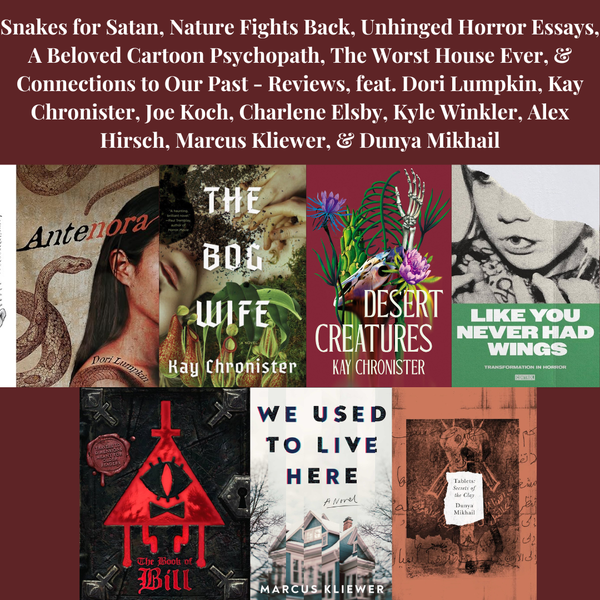Ya'know, to Become Your True Self, Ya Gotta End Some Li...I Mean...Break a Few Eggs. - A Review of Emma E. Murray's "Crushing Snails"
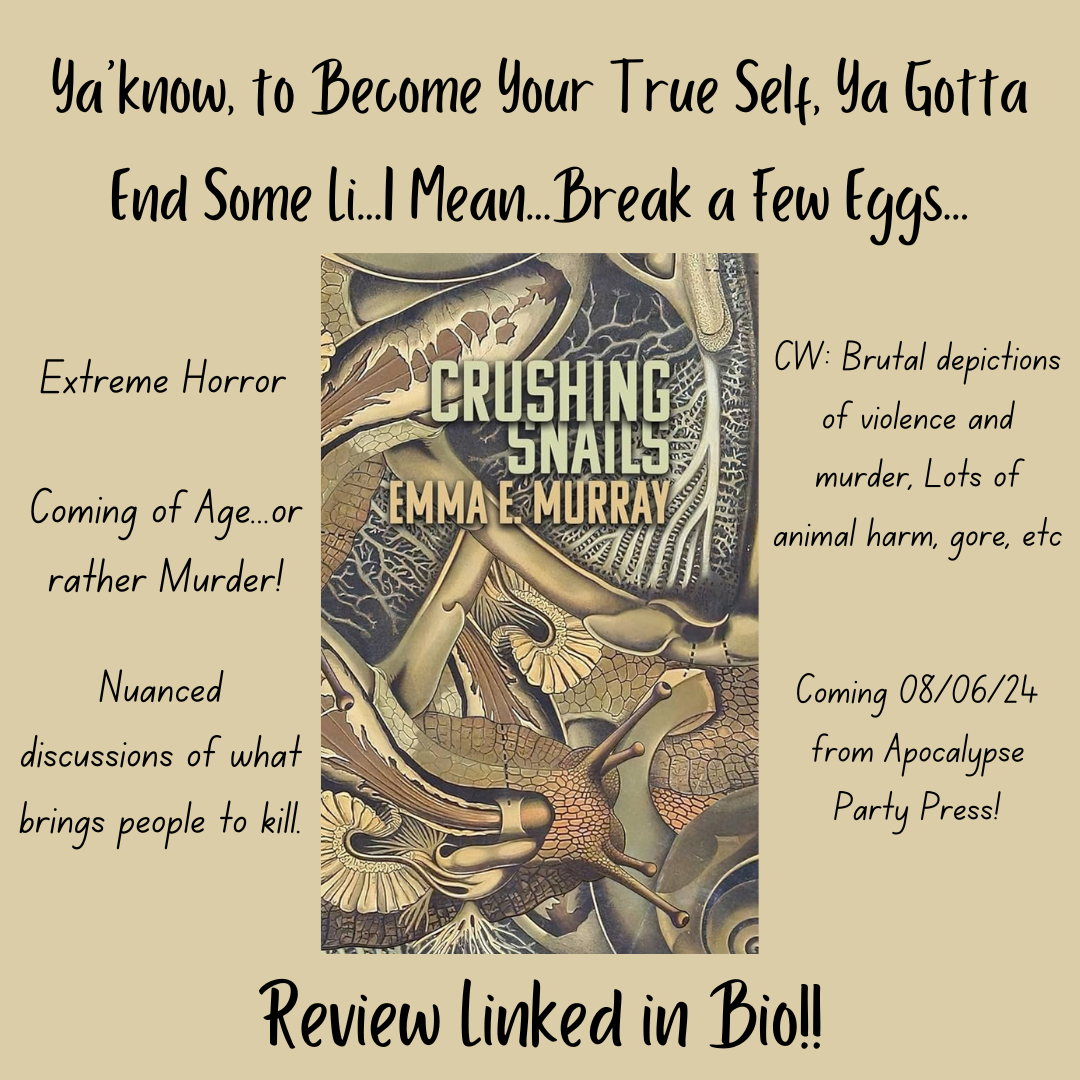
Emma E. Murray is having a hell of a year. Just a few months ago, her little novelette of sapphic rage revenge, When the Devil, burst onto the scene from Shortwave Press. But she's not quite done with us, as this August will see the release of debut novel Crushing Snails from the reigning champs of transgressive fiction, Philadelphia's own Apocalypse Party Press.
Frequently compared to Henry: The Portrait of a Serial Killer, the novel documents young Winne's ascension toward murder, but with the added nuance that makes the works of Charlene Elsby and Samantha Kolesnik endlessly compelling.
I will warn everyone now, this review will be discussing some tough topics and disturbing acts such as violence against animals, children, and more, so be sure to tread carefully. Extreme horror has an audience and if you know that's not you, maybe skip this one for now.
With that being said, let's dive into one of the most heartbreaking, stomach-churning, and multi-faceted extreme horrors of the year, right there alongside Elsby's Violent Faculties.
When Violence Becomes the Only Power Dynamic You Can Control In Your Life
Right off the bat, this story opens with a difficult situation. We're introduced to Winnie, as well as the complex and harmful dynamics of her mentally unwell mother, and a father who cherishes his wife over all else. Winnie's mother is tearing apart the walls in their kitchen, attempting to find the bugs that have been placed by the government to spy on them. When our young narrator attempts to confront and help her mother calm down, she is ultimately attacked, the mother spilling scalding oil on and beating her daughter, believing her daughter has been brainwashed. Finally the father intervenes, but it is to protect the wife and essentially leaves Winnie to suffer until the authorities arrive.
Woof, that's a lot, but it perfectly sets the stage for the madness that is to come. While frank depictions of mental health and physical/emotional abuse are never easy to read, this is a "birth of a serial killer" novel that is not interested in simple depravity. Much like Samantha Kolesnik's novella, True Crime, Murray is concerned with understanding what pushes our limits, as opposed to mere spectacle. Possessing a Psych degree and a lifelong curiosity with what often makes serial killers tick, there is a level of care with Winnie that consistently put readers at odds with the murders she ultimately commits.
Let's not mince words, Winnie's father, Cole, is a monster. Blaming her for the mother's institutionalization and eventual passing, he pits Winnie's siblings against her, forces her to do every chore and cook for the entire family, and god forbid she step even an inch out of line, lest she be brutally "punished," which I honestly cannot detail here. I could go on and on about the systems potentially responsible for Cole's beliefs and behavior, but that's a post in-and-of itself.
Abuse fosters abuse, this is an unfortunate fact that we seem to be aware of as a society but still continue to do absolutely nothing about. Throughout Crushing Snails we are provided many examples for what ultimately cracks Winnie's psyche, but there's a theme that screams through the transgression: a fight for autonomy.
Whether it's Norman Bates or Pearl Reid-Meredith, a common theme of media surrounding serial killers is the search for autonomy in the face of the emotional and physical abuses one may experience at home. Unfortunately this theme has been exploited to bank off of America's empathy, pointing it in the direction of merely sympathizing with the serial killer, yet ultimately doing nothing to discuss the systemic issues, or larger implications of these acts and why they often turn to violence.
When you're an oppressed individual there often appears to be no way out. Your oppressor holds much of the power over you, leaving you feeling disenfranchised and weak. As we've been shown time and time again through various forms of media and history, one of the few ways to revolt from oppression is violent uprising. We're given no other choice, so we have to push the only way we know how: forcefully.
There is much to be said for violent revolution, as it's often shown to get shit done, but it's also been used as a tool of the oppressor to highlight why they are now the safest option. The US was formed due to violent revolution against the monarchy, but instead of learning from our oppression as we searched for space to carry out this new project, we waged further war on the indigenous people who already lived on that land. Sure, it was one of the only methods we learned to do so, but we in turn became the oppressors and thus begun a seemingly never-ending repetition of hurt and harm.
What authors like Murray, Elsby, and Kolesnik offer, while not answers of how to curb these forms of violent behavior in budding serial killers, is a revealing of these patterns and conditionings that can lead someone like Winnie to seek that revolutionary power. Violence becomes her salvation because she has no other choice in the face of her family and place in society. However, it's the ways in which this violence exerts itself with power that becomes the stuff of horror...
Bringing the Weak to a Heel
Being that Crushing Snails is a study in the ascension of a serial killer, Murray does an excellent job displaying the mental and physical steps Winnie takes when finding ways to exert this power and curiosity.
As a society, we have never worked in harmony with animals as much as we could or should have. As we have done with non-white people, animals have been characterized as other so that we can distance ourselves from the violence of using them as food, or as ways to help create that food, or as transportation, and the list goes on and on. My point here is that in the hierarchy of beings, we see animals as below us. Scholar and activist Aph Ko has written extensively about what she calls "zoological witchcraft," which discusses the ways in which we use animals–and by extension non-white communities–as means to further empire, or rather build upon the myths we create for our colonial projects.
It's often because of these myths that we find it permissible to harm animals. They're not like humans, so they don't feel the same way we do. Why don't you tell that to my traumatized dog who has serious separation anxiety. I bring all of this up because Winnie's first steps toward embracing her power as violence is with a series of snails we witness her stepping on and crushing early in the novel, therefore speaking to the title and igniting my worst nightmares.
Because snails are more or less powerless in the presence of a big bad human, her rage and hurt can expel itself onto these harmless creatures and she won't have to necessarily worry about the death of these "insignificant" beings. This sparks the chain reaction that leads to Winnie's experimentations leading further and further up a food chain, later trying to poison a dog in one of the viscerally heartbreaking moments in the novel. Seriously, it is not for the feint of heart and Emma gratuitously apologizes for its inclusion.
That said, the inclusion of these earlier displays of power are necessary to show us not only how unwell our young antagonist is, but the harm and hurt with which she is seeking autonomy from. These moments are not included for shock value, but are a brutal but honest display of how these actions snowball into a larger issue. Think of everyone's favorite serial killer, Jeffrey Dahmer (thanks a heap, Ryan Murphy). Many media depictions point to the fact that Dahmer was murdering animals to prepare himself for the leap to humans. He recognized they were the few creatures he had some form of power over, thus seeing them as objects for his experiments. None of this should ever excuse these acts, as well as their perpetrators, but they do help us understand ways in which these people came to these actions. We as a society simply struggle to hold these multiple truths without falling into the traps of criminal idolatry.
Winnie's Leap of Faith
Another important facet to this story is Winnie's relationship with her anti-establishment, punk rock friend Gabe, who she often engages in conversations regarding murder and who she feels safe and understood by. We are granted some depictions of Gabe outside of Winnie's eyes within the interspersed transcripts of the police investigations following her disappearance. It isn't until much later that we learn how complicit he was in the larger escalations of murders. Although, it's not as simple as that sounds either.
Gabe may be a disillusioned character searching for meaning amidst their small town, but his flirtations with the concepts of taking a life are merely that–concepts. He represents the border/threshold many folks find themselves arriving at when daydreaming these sorts of revolts of power. He sees these discussions as a way to let off steam, meanwhile Winnie is sensing an ally in her friend. This solidifies when she finds herself suffocating her neighbors infant son, whom she has been tasked with babysitting. This was a little game she used to play with kids she was babysitting, but this youngster was the first time she took it this far.
Gabe seems to be relatively blasé about the affair, almost wishing he could get away with something so simple. Again, not because he truly wants to commit murder, but due to a desire to flex some form of power. Readers see Gabe as almost excited to know his friend has committed such an act of power, but that excitement quickly dissolves into sheer horror upon Winnie's most significant crime.
We are going to be getting into super spoiler territory at this point, as a heads up!!
Things significantly accelerate when Winnie witnesses a young girl, Leigh, who is friends with some girls she used to babysit. To her, Leigh seems to embody and represent everything Winnie could have been if she wasn't trapped in the family dynamics she inhabits. She even fixates on how much the girl resembles her, fostering an incessant obsession with her younger doppelganger.
As much as Gabe attempts to dissuade her from this obsession, Winnie's curiosities continue to grow as she works to form a bond of trust with the girl. She begins to see the potential murder of Leigh as a form of rebirth; if she can just destroy this doppelganger, she can transcend her current hell. After a particularly grueling night of "punishment" from her father, Winnie makes her move, luring the poor girl out into the woods and brutally murdering her. However, this causes our antagonist to panic, as she now must find a way to hide the body and guilts Gabe into helping her. This is where we witness Gab fully dissolving, setting the stage for the most heartbreaking and gruesome of the murders in the whole book.
Kill the Family In Your Head
Everything comes to a head on a fateful night where Winnie attempts to enlist her sister's help in setting up for dinner. Lilly is her own fascinating case in this novel. Throughout we witness connect with and disconnect from Winnie at different junctures, learning that she has to follow Cole's rules lest she be punished like Winnie. We sadly witness her kind of turning and acting against Lilly in many instances due to her fear of their father, but the biggest incident comes on this particular night.
Lilly pushes back against Winnie, alerting their father and causing him to punish Winnie in one of the most brutal ways seen previously. This can be seen as the moment she "snaps" in a way, causing our serial killer to take her final life of the story, that of Lilly's in a chilling chapter we witness from her sister's point of view. It's one of the few times we here from Lilly herself, and puts much of her behavior into perspective, thus making this final murder all the more heartbreaking. To Winnie, this becomes the final step to her metamorphosis, or "becoming," and leads to the investigation we are following alongside this origin story.
Was Winnie choosing Lilly one final act of defiance? Seeing as Cole fixates on Lilly due to her uncanny resemblance to their mother, this could be one final blow to their father before striking out on her own. We are treated to a letter written by Cole, basically detailing how much of a monster he is and still finds room to blame and scorn Winnie before appearing to die by suicide. Perhaps in her own twisted way, Winnie was attempting to save her sister from their father, but I think the sad truth is that Lilly acted as the last obstacle in her way, even though she believed Leigh to be that final piece.
Similar to events to Samantha Kolesnik's True Crime, we see someone rebelling against the oppression in their lives through the only means they understand, violence. We love throwing around the adage of "hurt people hurt people," and while this always true, it fails to dig to the root of why this phenomenon exists, and why we continue to perpetuate these cycles. Mental Illness is not the only cause of extreme acts of violence, as much as politicians and media outlets like to believe.
These characters in novels like this may struggle with forms of trauma and PTSD, their mental illness is not what creates their "monstrosity," but it is something that unfortunately exacerbates it, Murray does not focus on mental health as the reason why for much of this book because she understands that it is only part of the puzzle. Class, access, abuses of power, lack of resources–there are many factors that lead to stories like Winnie's and the less we try to wrap explanations up into easily digestible good vs bad, us vs them mentalities, the more we can come to understand that much of the structures meant to help and embolden us are what we must stand against. Otherwise we are doomed to keep the cycle repeating.
There is so much more to these topics, but these were my initial thoughts when finishing these marvelous look into the darker aspects of human nature. I so often reference authors like Charlene Elsby and Samantha Kolesnik because they are two very strong voices exploring much of these themes and structures that often go unexplored in fiction, save the rare cases that do so within a satiric vein. What makes their work and Emma E. Murray's growing repertoire so compelling is the humanity that they are exploring beside such horrific acts and images.
It's easy for us to hear the facts and demonize a character because then we don't have to engage with the larger issues at play. What makes Winnie's story so heart-wrenching is so much of this could have been avoided. Many depictions of serial killers view their turn as a means to an end and completely unavoidable, but that is just not the case. Winnie, Lilly, Leigh, the infant, the animals–they all could have been saved if we as a society could allow ourselves to dig into the larger systemic issues that effect us all. My hope is that stories such as Crushing Snails can help readers to begin to untangle how these issues effect one another, prompting those very necessary forms of critical thinking under white supremacy.
If you are someone who is fascinated by serial killers, you have the stomach for some pretty intense violence, and want to read depictions that don't feel like glorification click-bait, then I strongly recommend this powerful and effective novel when it is released on o8/06.
You can also enter to win a copy coupled with some other exciting goodies over on Emma's Instagram page @emmaemurray_!!

